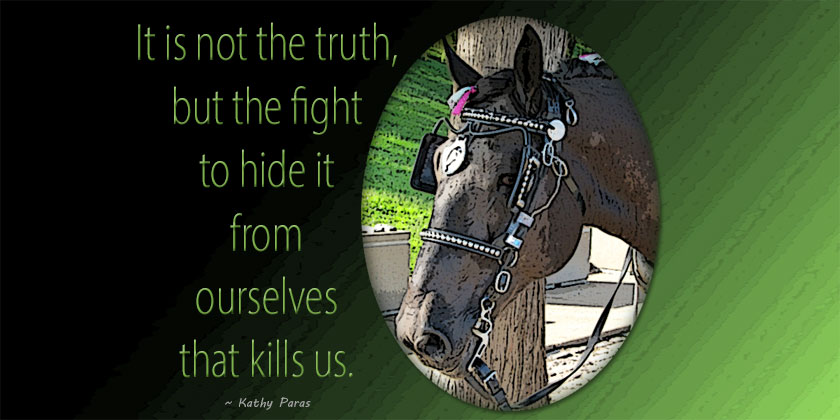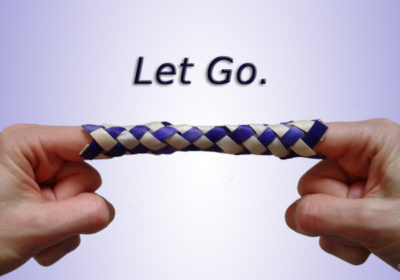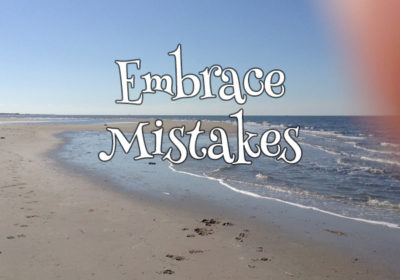In a way we are all actors, showing people only what we want them to see, what we want them to believe. Even working to distract and deceive ourselves.
Many of us do the job so well, we end up going through the routine of our lives wearing blinders. Like horses pulling carriages in Central Park, strategically blinded to all but what is necessary to get us through the task at hand. If we live that way too long, we may forget there is any other way.
We may be in that tightly focused, narrow lane of life because of necessity, or because it has turned out to be effective at getting us something we want. Creature comforts. Financial security. Friends.
Or because the darkness off to the side is too frightening.
We zone out and ignore things because they are uncomfortable or painful. Society encourages us to do it. Family teaches us to do it. We may have been conditioned to believe that as long as there are people worse off than we are, we have no right to be dissatisfied with our experience of life. We are deemed negative, ungrateful, selfish. People just don’t want to deal with our negative emotions. And we learn to do the same.
By ignoring, repressing or talking ourselves out of experiences that make us feel dissatisfied, sad, fearful, angry, resentful, lonely, threatened… we keep ourselves blindfolded and in the dark.
But this doesn’t make those things go away. They remain trapped inside us and control us in ways we don’t understand and can’t predict.
What are you hiding from yourself in order to survive?
When something is wrong or inappropriate or out of alignment, we know. On some level, we know. It doesn’t matter how good we are at compartmentalizing, part of us knows. In order to get through the day we may pit one part of ourselves against another. And when the deceiver becomes stronger, we might even convince ourselves that it’s for our own good. The devil whispering on our shoulder. I’m doing this to protect you. You don’t need to go there, into that pain, it’s too hard, it’s not worth it. You can survive, even succeed without addressing that.
We become like those horses, led and directed by a force that doesn’t seem to be part of us. Doing what we’ve trained ourselves to do. Believing that if we obey, we’ll continue to be fed and sheltered and cared for. But that low-level conflict will always exist, between what we tell ourselves we must do and what we instinctively know to be our natural state.
No matter how securely we lock that knowledge in a tiny box in the darkest recesses of our being, it will not stay quiet. It will never stop trying to be heard. And fighting it, keeping that box locked, takes a lot of energy.
How often do you find yourself in a mental debate, ruminating through a long thread of arguments and explanations, trying to understand and explain an uncomfortable experience or negative result in your life? Or trying to figure out just the right words to make others understand, because then your problems would be solved. Is your mind ever quiet on this front?
People who are confident in their identity and their actions don’t feel the constant need to explain and justify. Their minds are calm and quiet. They are okay with where they are. They recognize uncomfortable, negative experiences as part of life, or signs that more growth is required.
If you experience a constant internal debate, it may be that there is truly something you need to change. But it may also be that someone else has made you believe there is, when there isn’t. Some relationship dynamics are defined by one person keeping another convinced that they are at fault, that they are the cause of their own discomfort, when in reality it is the convincer who is behaving inappropriately. Although we all need to continue to grow and change, we each need to do it based on our own standard, not someone else’s standards or needs or beliefs.
Wasted Energy
Regardless of the drivers behind the internal struggle, this constant fight takes up room inside us. It robs energy and bandwidth from other things we need or want to do, like a computer with too many processes running in the background.
With this battle raging inside, this struggle to resolve an internal pain, it’s difficult to pull your attention to anything else. Just like a person with a newly broken bone cannot focus on conversing with you about the latest news because the pain is demanding all his attention.
When we drift inward and withdraw and this becomes a way of life, it can lead to isolation, depression, deteriorating physical health, loss of relationships, a sense that life is passing us by, or that we are not even able to handle the basics, leaving us overwhelmed. Our CPU is over-capacity with the arguments, struggling to keep up the justifications or trying to figure out how to make our invented explanations fit with the reality that is confronting us.
The only thing our constant explanations are doing is taking up room and energy that we could be using to make life better.
Understanding feels better than blindness
Letting go of the battle to hide the truth from yourself and others lifts a burden and frees up bandwidth for new understanding, the possibility of change and improvement, and the ability to take control of the only thing you can control—you.
Understanding can bring a profound calm. You may not like where you are, you may not know what to do about it yet, but if you can identify what’s going on and accept it, let it be what it is, let yourself know what you know and feel what you feel, something inside releases.
Abandoning our well-thought out rationalizations is difficult. It takes maturity. The willingness to see beyond the beliefs we cling to. Beliefs that help us survive. Letting go of anything causes us to experience loss. And processing loss requires a period of grieving. No matter what the thing lost is, we must progress in some form through denial, anger, bargaining, and depression before we can get to acceptance.
Acceptance—becoming Okay with where you are now—does not mean coming up with a rock-solid justification for it as a permanent state of being. It means acknowledging what it is. Good or bad. Like it or not. Simply as information to use to determine your next move.
Even when we begin to understand a new concept, it takes time to let it sink in and expand our awareness of what’s possible. Even longer to learn appropriate ways to respond, and actually initiate motion toward change.
Start by taking off the blinders and looking around. Don’t put too much pressure on yourself to do anything immediately. Just look around. Absorb what you see. And when your mind starts spinning explanations, stop. Ask yourself…
Who am I arguing with?
Who am I trying to convince?
Why?




